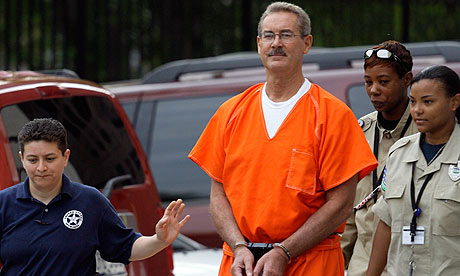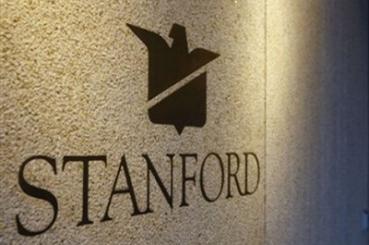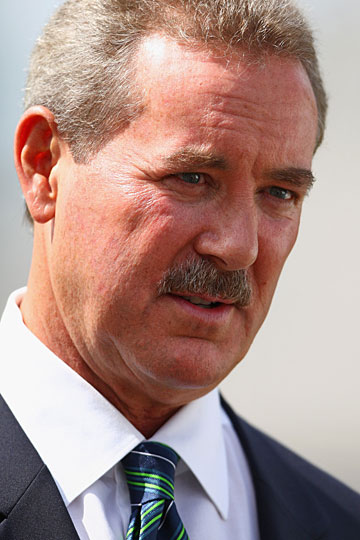According to the federal indictment, "Sir Allen," as he was
dubbed by a corrupt former minister of Antigua, ran a massive
Ponzi scheme camouflaged as a bank that sold some $7 billion
in self-styled "certificates of deposit" and $1.2 billion in
mutual funds.
Operated from behind a façade of well-appointed offices and
with a jet-set lifestyle to match, the Stanford grift may have
been impressive but it was a scam from the get-go. Lured by
"high rates that exceed those available through true certificates
of deposits offered by traditional banks," thousands lost
their shirts.
Those high rates were a lie and the bank's "unique investment
strategy" about as legitimate as a penny-stock fraud or advance
fee scam on the internet. Of the $8 billion hoovered up by
the banker and his cronies, only about $500 million have been
recovered.
Facing the prospect of years in prison, The Miami Herald
reported that SIB's chief financial officer James Davis, once
Stanford's college roommate and originally charged in the
indictment, copped a plea to save his own neck.
Davis told the Justice Department that "his boss had been
stealing from investors for decades while paying bribes to regulators
and even performing blood oaths never to reveal his secrets."
Talk about a wise guy!
And with connections and generous pay-outs to U.S.
politicians going back more than a decade, 65% of which went to
Democrats
including our "change" president, Allen Stanford was
plugged-in.
Evidence also suggests he may have gotten an assist covering
his tracks from regulators and U.S. secret state agencies, including
the CIA.
SEC Stand Down
Allen Stanford did business the American way; he swindled
depositors and then siphoned-off the proceeds into a spider's web of
offshore accounts.
The indictment charges "it was part of the conspiracy that
Stanford... and others would cause the movement of millions of
dollars of fraudulently obtained investors' funds from and
among bank accounts located in the Southern District of Texas and
elsewhere in the United States to various bank accounts
located outside of the United States... in order to exercise exclusive
control over the investors' funds."
Auditors learned that funds were moved through
Stanford-controlled accounts to offshore banks, including HSBC in
London, Bank
Julius Baer in Zurich and eight others; banks which have
figured in past money laundering or tax-avoidance scandals. None have
been charged with an offense in connection with the affair.
In all, 28 numbered accounts were listed by prosecutors,
veritable black holes that escaped scrutiny; that is if regulators in
Washington were minding the store, which they weren't.
Years earlier, SEC investigators at the commission's Ft.
Worth office uncovered evidence of wrongdoing. According to an explosive
report by the SEC's Office of the Inspector General, Ft.
Worth examiners launched a series of probes in 1997, 1998, 2002 and
2004 exploring SIB practices but their diligence was
sabotaged by high-level officials.
That report, Investigation of the SEC's Response to Concerns
Regarding Robert Allen Stanford's Alleged Ponzi Scheme, Case No.
OIG-526, March 31, 2010, paints a damning picture of the
regulatory process.
The inspector general states: "While the Fort Worth
Examination group made multiple efforts after each examination to
convince
the Fort Worth Enforcement program ('Enforcement') to open
and conduct an investigation of Stanford, no meaningful effort was
made by Enforcement to investigate the potential fraud or to
bring an action to attempt to stop it until late 2005."
Last month, the Fort Worth Star-Telegram reported that staff
members, who spoke on condition of anonymity because they feared
management retaliation, told the newspaper that higher-ups
wanted "tools to do away with people who have a dissenting opinion."
Senior managers called the probes a "goat screw" and ordered them killed.
The OIG investigation "found that the former head of
Enforcement in Fort Worth, who played a significant role in multiple
decisions over the years to quash investigations of Stanford,
sought to represent Stanford on three separate occasions after he
left the Commission, and in fact represented Stanford briefly
in 2006 before he was informed by the SEC Ethics Office that it was
improper to do so." (emphasis added)
In Florida, The Miami Herald revealed that state regulators
did the SEC one better and gave the bank carte blanche to operate
secretly, moving "vast amounts of money offshore--without
reporting a penny to regulators."
The arrangement between the bank and the Florida Office of
Financial Regulation was so brazen, that Stanford's company "was
allowed to sell hundreds of millions in bank notes without
allowing regulators to check for fraud."
And once those suspect instruments were sold, the Herald
reported that "employees shredded records of the trust agreements
and CD purchases once the original documents were sent to
Antigua, state records show."
A sweet deal if you can get it, or have powerful friends who
might wish to avoid messy inquiries touching upon sensitive
matters.
The New York Times reported last year that current charges
"stem from an inquiry opened in October 2006," that is, nearly a
decade "after a routine exam of Stanford Group, according to
Stephen J. Korotash, an associate regional director of enforcement
with the agency's Fort Worth office."
Korotash told the Times that the SEC "stood down" its
investigation "at the request of another federal agency, which he
declined to name."
According to BusinessWeek, in 2006 the Bush administration
"bestowed on his intelligence czar... broad authority, in the name
of national security" to excuse companies from "their normal
accounting and securities-disclosure obligations" if such
disclosures revealed "certain top-secret defense projects."
At the time, William McLucas, the Securities and Exchange
Commission's former enforcement chief told the publication that the
ability to conceal financial information from regulators
under the rubric of "national security" could lead some companies "to
play fast and loose with their numbers."
The former official said, "it could be that you have a bunch of books and records out there that no one knows about."
In response to media reports, congressman Dennis Kucinich
(D-OH), wrote a letter to SEC Chair Mary Schapiro last year,
demanding documents, and answers, why the SEC suspended
investigations of the "Stanford Group under pressure from another
unidentified federal agency."
The Ohio congressman said, "if this is true... our
subcommittee will demand that the SEC reveal the name of that agency
which
told it not to enforce federal laws which protect investors."
Neither documents nor answers were forthcoming.
Cynics might see something untoward here, but I think it's
all just a coincidence, like drug planes bought with bundles of cash
laundered through American banks.
Drug Probes Killed
In 1986 during the Iran-Contra period, Allen Stanford's
Guardian International Bank set up shop on the sleepy Caribbean isle
of Montserrat (pop. 5,870).
It didn't take long before the bank came under scrutiny.
Guardian was the subject of a joint Scotland Yard-FBI investigation
"into so-called 'brass-plate' banks," The Independent
disclosed.
According to reporters David Connett and Stephen Foley, the
bank "was suspected of laundering drug money from the notorious
Medellin and Cali drug cartels run by Pablo Escobar and the
Orejuela brothers."
During the Iran-Contra scandal, congressional investigators and journalists scrutinized links between Colombian drug
traffickers and the CIA's Nicaraguan Contra army.
By 1986, evidence began to emerge that top Contra officials
and the Agency enjoyed cosy ties with both Escobar and the
Orejuela brothers. Under pressure from the Reagan
administration however, both Congress and corporate media deep-sixed the
story as the affair was covered-up.
A decade later, largely as a result of outrage generated by the late Gary Webb's Dark Alliance series, a
memorandum of understanding
between Reagan's
Justice Department and the Agency entered the public record.
That 1982 memo legally freed the CIA from reporting drug
smuggling by their assets.
Former FBI agent Ross Gaffney who led the Guardian probe,
told Connett and Foley that "we suspected that Stanford's bank
was involved in money laundering." But before that
investigation could be developed, Stanford suddenly pulled up stakes and
"voluntarily surrendered his Montserrat banking licence and
left the island."
Gaffney said that even after Guardian closed, the FBI
"continued to take an interest in Stanford and set up a second inquiry
into that bank after receiving intelligence that it continued
to launder money for the Medellin and Cali cartels."
The former federal agent told The Independent, "We had hard
intelligence about what he was doing and we began to develop it"
but the investigation died or more likely, killed, by
officials higher-up the food chain.
After leaving Montserrat, Stanford trained his sights on
Antigua and Barbuda and developed a close relationship with former
prime minister Lester Bird.
"Under the Bird family leadership" Connett and Foley
reported, "the island was widely regarded as one of the most corrupt in
the Caribbean, with well-documented links to arms and drug
smuggling and money laundering."
According to The Independent, "in 1990, Israeli automatic
weapons ordered by Mr Bird's brother Vere turned up in the hands of
a notorious Colombian drug trafficker."
Despite suspicions, it appears that Stanford was golden as
far as the feds were concerned; just another guy with an endless
supply of "get-out-of-jail-free" cards.
One reason Stanford operated with impunity, the BBC informs us, is that he "may have been a US government informer."
DEA documents seen by BBC's investigative unit Panorama,
suggest that "drug money [was] originally paid in to Stanford
International Bank by agents acting for a feared Mexican drug
lord known as the 'Lord of the Heavens'."
Confidential DEA sources believe that Stanford turned over
"details of money-laundering from Latin American clients from
Colombia, Mexico, Venezuela and Ecuador," thus "effectively
guaranteeing himself a decade's worth of 'protection' from the
authorities, especially the SEC."
"We were convinced that Stanford's bank attracted millions of
narco-dollars," sources told Panorama, "but it was very difficult
to get the evidence to nail him."
"The word is" BBC reported, "that Stanford has been a confidential informer for the DEA since '99."
Snitch or not, this raises intriguing questions.
Was Stanford's bank a black hole which U.S. intelligence
agencies could exploit, in the interest of "national security" mind
you, and therefore exempt from "normal disclosure
obligations" as BusinessWeek averred?
If this were so, then even if Stanford were an informant he
could have continued to launder drug money and profit nicely; such
gentleman's agreements are not without precedent.
One need only glance at internal U.S. government documents
released by the National Security Archive, documents which revealed
the Cali cartel's close collaboration with corrupt Colombian
police, neofascist paramilitaries and the CIA when Medellin drug
lord Pablo Escobar was run to ground.
Pointedly, was Stanford's banking empire another in a long
line of institutional channels that drug cartels and the CIA could
both profit from?
Banks, Drugs and Covert Operations
Across the decades, historians, investigative journalists and
researchers have uncovered strong evidence that various banks
have served as virtual cut-outs for CIA covert operations.
Readers need only recall illegal activities by institutions
as diverse as Paul Helliwell's Castle Bank and Trust in the Bahamas,
Frank Nugan and Michael Hand's Nugan Hand Bank in Sydney and
the Cayman Islands, or the far-flung empire of Agha Hasan Abedi's
Bank and Credit and Commerce International.
Separated in time and geography, what all three banks had in
common was their close proximity to international drug trafficking
networks and the CIA, particularly in areas of acute interest
to U.S. policy planners. Did Stanford International Bank have a
similar arrangement with the Agency?
When the scandal finally broke, the Houston Chronicle
reported that authorities had been "looking for ties to organized drug
cartels and money laundering, going back at least a decade."
In the late 1990s, court documents revealed that "operatives
of the Juarez cartel began opening accounts at Stanford's
Antigua-based bank," laundering profits amassed by the Amado
Carrillo Fuentes organization, the late "Lord of the Heavens"
referred to in the BBC report.
The Chronicle notes that Fuentes' representatives "used
Stanford International Bank to open 10 accounts and deposit $3 million."
We should bear in mind however, these represent only known
accounts. Were there others? Federal and state investigators have
said that there were.
After authorities determined the accounts were held by a
notorious drug cartel, Stanford turned over the $3 million. Yet despite
hard evidence of criminal wrongdoing, federal officials told
the Chronicle that "any alleged Stanford connection to drug cartels
and their money could lie buried in the paperwork gathered
for the Security and Exchange Commission's civil inquiry."
One might even say rather conveniently.
During the same period, Texas state securities regulators
uncovered more evidence of money laundering by Stanford entities.
But because it involved offshore banks, they "referred it" to
the FBI and SEC.
Texas Securities Commissioner Denise Voigt Crawford told a
Senate Finance Committee last year, "Why it took 10 years for the
feds to move on it, I cannot answer."
Miffed by government foot-dragging, Crawford added, "We
worked with the FBI and the SEC and basically gave them the case. We
told them what we'd seen and they were going to run with it."
But that investigation died on the vine.
Echoing similar themes, The Observer disclosed an FBI source
close to the investigation confirmed that the Bureau "was looking
at links to international drug gangs as part of the huge
investigation into Stanford's banking activities."
The Observer reported that Mexican authorities seized one of
Stanford's private jets in connection with alleged links to the
Gulf cartel and said that "cheques found inside the plane
were linked to the cartel, which is one of the most violent criminal
organisations in the world."
DEA sources told the London newspaper "there may well have
been a trail connecting his Mexican affairs to narco-trafficking
interests." However, a second DEA official told The Observer,
"I think we'll find that any possible drug-related trail and SEC
priorities are not all in the same frame."
A curious statement considering the billions of dollars in
fraudulent activities alleged against the bank, some of which may
have been derived from laundering drug money.
One would assume that evidence of serious wrongdoing would be
motive enough to take a hard look at the allegations and not
concoct a fairy tale that these charges lie "buried in the
paperwork"!
A U.S. drug enforcement official told The Observer, "Any
major US interest seeking to avoid fully disclosed investments would
have to go to pretty careful lengths to avoid encountering
cartel interests."
"Anyone seeking to conceal or launder money would find it in
safe and lucrative hands were they to forge alliances with, rather
than skirt, the cartels," The Observer noted, and would "find
them accommodating in terms of remuneration." The official hastened
to add, it's "nothing anyone will confirm for Stanford right
now."
The question is: why?
A Full-Service Bank
One possible answer may revolve around charges that SIB's Venezuela branch was a conduit for laundered CIA funds.
If true, then the Agency would be dead set against trial
disclosures that revealed the bank had been involved in laundering
drug money, particularly if narcotics syndicates are playing a
role in U.S. destabilization efforts there.
Months before Stanford's empire collapsed, Venezuela's
socialist government launched a raid on SIB offices in Caracas.
The Daily Telegraph reported that "Sir Allen Stanford, the
Texan billionaire... is now at the centre of an international
spying row."
The conservative British newspaper disclosed that "officials
from Venezuelan military intelligence raided a branch of his
offshore bank over claims that its employees were paid by the
CIA to spy on the south American country."
Although corporate media in the U.S. dismissed Venezuelan allegations as propaganda, questions persist.
While on a charm offensive before his arrest last year,
Stanford gave an interview to CNBC's Scott Cohn. When asked about
claims that his bank may have been a cut-out for the Agency,
this curious exchange took place:
Cohn: "You just by nature of your position and where you were
got to know a lot of people in Latin America, in Africa, in
Europe, around the world, and it strikes me that somebody in
your position would be useful to the authorities in the US
trying to find out what was going on there, what was going on
in places like Venezuela. Can you tell me about any sort of
role you played that way, were you helpful to the authorities
in the US?"
Stanford: "Are you talking about the CIA?"
Cohn: "Well, you tell me."
Stanford: "I'm not going to talk about that."
Cohn: "Why not?"
Stanford: "I'm just not going to talk about that."
Cohn: "Well, I mean, am I--is my premise correct that someone
in your position would be helpful to those who wanted to know
what was going on?"
Stanford: "I really don't have anything to add to that that would be of any value."
Stanford's reticence is certainly understandable, considering Frank Hand's fate 30 years ago.
During a similar scandal when the CIA-linked Nugan Hand bank
collapsed amid charges of fraud and drug money laundering, the
chief executive turned up dead in his Mercedes with a shot to
the head.
Despite evidence uncovered by investigations going back to
the 1980s, drug money laundering charges or any reference to Agency
activities will not figure in the Justice Department's case
when Stanford goes on trial in January.
As ABC News delicately put it, SEC action against Stanford "may have complicated the federal drug case."
Underscoring the federal government's reluctance to explore
this dark corner of Allen Stanford's career, it might do well to
keep in mind what one airline executive told investigative
journalist Daniel Hopsicker during his probe into the 9/11 attacks.
"Sometimes when things don't make business sense, its because they do make sense... just in some other way."







